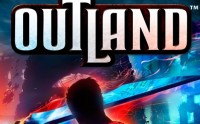The 2D platformer is seemingly in something of a renaissance at the moment, certainly evidenced by the surge, or plague depending on your sensibilities, of such titles making it to market in recent years. Particularly popular amongst smaller or independent studios for a number of reasons – a cynical mind might suggest their comparative low cost and ease to make – the majority find their home on the number of online stores where they must jostle for the users’ attention, and a glowing review can mean the difference between commercial success or gathering dust.
So at this point, step forward Outland. The product of the minds at Housemarque, developers of such titles as Super Stardust HD and Dead Nation, Outland is a stylised 2D platformer recently released onto PSN and Xbox Live Marketplace. But is it worth your time?
Compared with its aforementioned predecessors, it has a lot to live up to aesthetically and does so with some gusto. Outland manages to be extremely pleasing to the eye with some incredibly detailed scenery and backgrounds despite all foreground objects and landmarks being completely black in contrast with the single-coloured backgrounds that differ for each area. Far from being flat or simplistic, all the environments are vivid and engaging without feeling cluttered, especially when accompanied with the musical score. Much like the graphics, it makes its presence known and does a wonderful job of accentuating each area without being overbearing. What we end up with is a well-defined game that does not force itself upon the player.

Gameplay-wise, Outland is much like any other game of its kind: running through stages, defeating a variety of enemies and avoiding stage hazards as well as defeating the usual ensemble of bosses. However, what sets it apart and makes it truly unique is its incorporation of elements from the least likely of sources: the bullet hell shooter.
Others have referred to Outland as the love-child of the classic ‘Metroidvania’ style of games and Ikaruga, and such a description is apt. Much like Ikaruga, the protagonist is able to switch polarities at will between light and dark – here, blue and red respectively – and must do so to attack enemies of the opposite colour, absorb energy of the same colour and make his way through the numerous energy-spewing hazards the game will throw at you. What we’re left with is a game that feels instinctively like any other of its genre but keeps the player on their toes. Especially in the latter parts of the game where you will often find yourself not only having to cut a path through large amounts of enemies and navigate a tricky stage, but constantly switch polarities to avoid taking damage or avoid it all together. It certainly takes some getting used to but it’s hugely rewarding and will soon become second nature.
Unfortunately, the weakest part of Outland is its plot, which can be described as arbitrary at best. We are introduced to our hero who is experiencing visions of an event in the past where two goddess sisters who’ve created the world are now trying to destroy it, only to have been thwarted by an ancient hero. From here our present day hero sets out to accomplish the same feat. Apart from the odd piece of narration after the defeat of one the game’s bosses, nothing else is ever expanded upon. Our hero remains effectively anonymous, the goddesses are never given any real motivation for their wish to destroy this world they’ve created nor is any link made between the past and current hero and why either felt compelled to take up the fight. It feels very open-ended and ambiguous; almost tacked on as a way to justify itself. Fortunately, the game’s strengths far outweigh this shortcoming and it’s certainly worth playing despite this.

Overall, Outland is an excellent title and surely deserving of the praise it has received thus far. Housemarque have taken the already established elements of the traditional platformer, introduced the most unlikely of new elements and made it work in a most glorious fashion. Lacking in narrative it most certainly is, but if you can forgive that and jump in with both feet, you will be rewarded with a game that stimulates in all the right ways. And hey, if we can live with merely the concept of a plumber rescuing a princess, I’m sure we can let slide an unknown warrior striving to stop two goddess sisters…and their unholy constant waves of projectiles.
Developer: Housemarque
Genre: 2D Platformer
Game Length: About 6-8 hours
Gripes: Weak plot
Get it for the: Challenging gameplay, distinctive graphical and aural presentation
Platform: Playstation 3, Xbox 360
Full Disclosure: Copy of game was purchased and paid for in full
